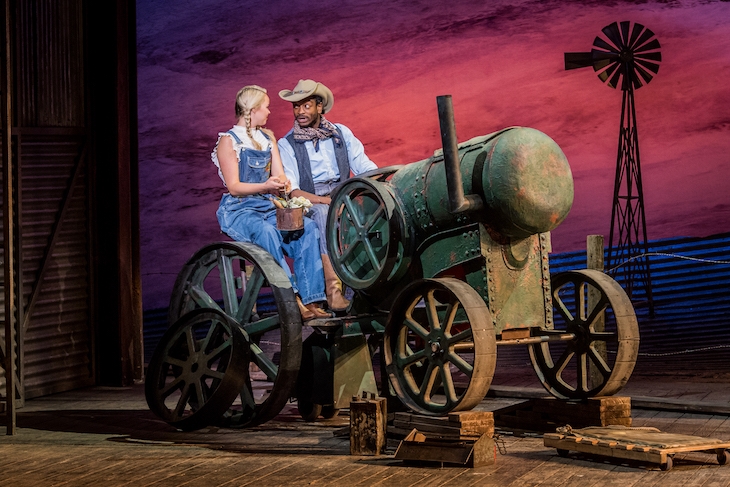Oh, what a beautiful morning! In Jo Davies’s production of Oklahoma! the audience spends the overture staring at the side of a barn. Then, as birdsong rises from the orchestra, corrugated-iron doors slide open on a dustbowl farm of the 1930s. Aunt Eller (Claire Moore) is fixing a tractor, and a wind pump spins slowly against an orange dawn sky. It’s mildly surreal: the light falls as if in one of those New Deal-era western landscape paintings, with a jagged, David Smith-like sculpture of pitchforks and shovels serving as a tree. And then, with throwaway ease, Dex Lee as Curly launches into that greatest of all Broadway opening numbers.
Davies catches Rodgers and Hammerstein’s surge of hope on the upswing, and rides it in a single sweep from beginning to end. Bruno Poet’s lighting and Andrew Wright’s boisterous, rough-cut choreography are part of a single conception, one that manages to explore some remarkably sinister places without upsetting the show’s basic optimism. The cast is drawn primarily from musical theatre, and whatever the loss in purely vocal thrills (there’s light amplification, though everyone here can hold a tune, and as Laurey, Katie Hall’s top notes tingle) they make hay with the spoken dialogue.
So the comedy of the screwball love triangle — Annie (Natasha Cottriall), Will (Louis Gaunt) and Ali Hakim (Steven Serlin) — bubbles up naturally from the characterisation. Cottriall, in particular, is a delightfully likeable Annie with something serious to say, far from the usual calf-eyed ditz. Lee’s sunny charisma as Curly is a necessary foil for Hall’s Laurey — a young woman at snapping point, whose pigtailed self-possession shatters more than once into outright fury. Like I said, this is an Oklahoma! that isn’t afraid to go dark. Curly taunts Jud Fry (Phillip Rhodes) for living in a hole, but one of the many inspired elements of Francis O’Connor’s designs is to keep the whole thing inside that barn. The open prairie is visible in the distance, but everyone here is living in the hole of social convention.
Rhodes, meanwhile, has an eerie ability to draw silence in around him. He’s vulnerable as much as menacing, and his Jud could be the bullied kid brother of Carousel’s Billy Bigelow. It was Agnes de Mille who first spotted that Oklahoma!’s narrative engine is sexual frustration, and against the general cheerful sense of sap rising this production has an unsettling undertow of anxiety. I’ve not seen Laurey’s dream-ballet go quite so full-on Freudian, and when Laurey and Curly finally kiss — and boy, do they kiss — a thunderstorm is not far behind.
As to the question (really, still?) of whether Oklahoma! belongs in an opera house, I can’t think of a better answer than the playing of the BBC Concert Orchestra under Richard Balcombe. No straight theatre would ever field a 50-piece orchestra, yet the timbre of a symphonic string section was vital to Rodgers and Hammerstein’s Broadway revolution. Michael Tanner once expressed surprise at the enthusiasm with which orchestras play this music. I defer to his judgment on most operatic matters, but I suspect he hasn’t played in one of these shows and felt for himself how Robert Russell Bennett’s orchestrations sing off the page. Orchestras adore music that makes them sound good, and the BBC players delivered it with a smile, if not quite a snap.
But then, there’s only one conductor in the UK who can guarantee that, and he was at the Aldeburgh Festival for an all-Bernstein gala. Last year I called the John Wilson Orchestra the greatest show on earth, and from the raucous, taxi-horn opening blast of ‘New York, New York’ to the encore (‘Some Other Time’ — any other conductor would have yawned and reached for ‘Make Our Garden Grow’) nothing I heard at Aldeburgh made me revise that opinion. Wilson understands that it’s all about the orchestrations. Clarinets wriggled, squealing, through ‘Wrong Note Rag’, and as Kim Criswell gave a vocal shimmy in ‘I Am Easily Assimilated’, a string chord fanned out behind her, each line delicately shaded. The JWO never, ever, sounds like classical stiffs condescending to swing. The brass and reeds are street fighters: this might be the one orchestra that can still make West Side Story feel dangerous.
Wilson picks his singers with the same flair. Nadim Naaman floated the melody of ‘Spring Will Come Again’, later recycled as part of the Chichester Psalms. And in booking Kim Criswell and Louise Alder (who seems, happily, to be everywhere this summer) Wilson appeared, cheekily, to be setting up an 18th century-style battle of the divas. But how to choose between Alder, gleefully pealing out diamond-cut coloratura in ‘Glitter and Be Gay’, or Criswell, unleashing her bulletproof pizzazz on ‘I Can Cook Too’ while Wilson’s heroes sizzled behind her? ‘I’m cookin’ with gas,’ she growled. You said it, lady.






Comments